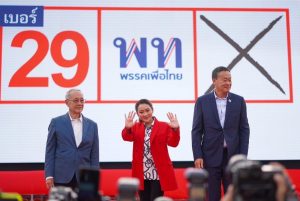Thailand’s Move Forward Party (MFP) will not vote for the prime ministerial candidate put forward by its former coalition partner Pheu Thai, the party announced yesterday, adding another twist to the country’s long post-election deadlock.
In a press conference, MFP Party Secretary-General Chaitawat Tulathon said that the party’s 150 MPs had reached a consensus to sit out the prime ministerial vote, doubtful that a Pheu Thai Party (PTP)-led government would be “able to serve the people.”
“The formation of the government now is not reflective of the people’s voice,” he said after a weekly meeting of party MPs, the Bangkok Post reported. “It is clear that senators and other parties want to shut Move Forward down.”
The MFP scored a surprise victory at the May 14 election, winning 150 seats in the 500-seat House of Representatives. However, despite assembling an eight-party coalition, including the PTP, it was twice blocked from having its leader Pita Limjaroenrat confirmed as prime minister. This has been largely due to the presence of the 250 military-appointed senators, who used their numbers to obstruct Pita’s candidacy.
The MFP then said that it would allow PTP, which won 141 seats in the election, to nominate its own candidate for the top office. But the alliance between the two parties broke down after conservative parties said that they would refuse to support any government that included the MFP, which has advanced an explicitly anti-establishment policy agenda.
Pheu Thai has since formed a new alliance with Bhumjaithai, a royalist party, and a host of smaller parties, in a bid to form the next government. But it still faces the challenge of reaching the threshold of 375 seats necessary to confirm its prime ministerial candidate, the real estate developer Srettha Thavisin.
There was previously some suggestion that the MFP’s House members might support Srettha’s candidacy in order to overcome any opposition from the Senate, but the party has now backed out, seemingly resigned to a role in opposition.
PTP leader Chonlanan Srikaew said yesterday that he respected MFP’s decision, and expressed confidence that the party will get more than the 375 votes that it needs to form government. “We respect Move Forward’s decision and we are able to work with all parties,” he said, according to Reuters.
How much it will have to compromise to do so remains to be seen. Despite its long history of clashes with the military-backed establishment, it has been forced to lobby for the support of parties and senators allied with the “uncles” – the generals involved in the 2006 and 2014 coups that overthrew Pheu Thai-led governments. The party not only needs votes from junta-appointed senators; it is also having to court the support of the military-backed Palang Pracharath Party and United Thai Nation Party in order to build the majority necessary to pass legislation and govern effectively once in office.
What concessions Pheu Thai has to make to secure that support, and what impact these concessions will have on the PTP’s future electoral viability, remains to be seen. The continuing impasse – it is now three months since the general election – also raises the possibility that Pheu Thai will fall short of the support it needs, leading to the possible emergence of another military-backed minority government.
































